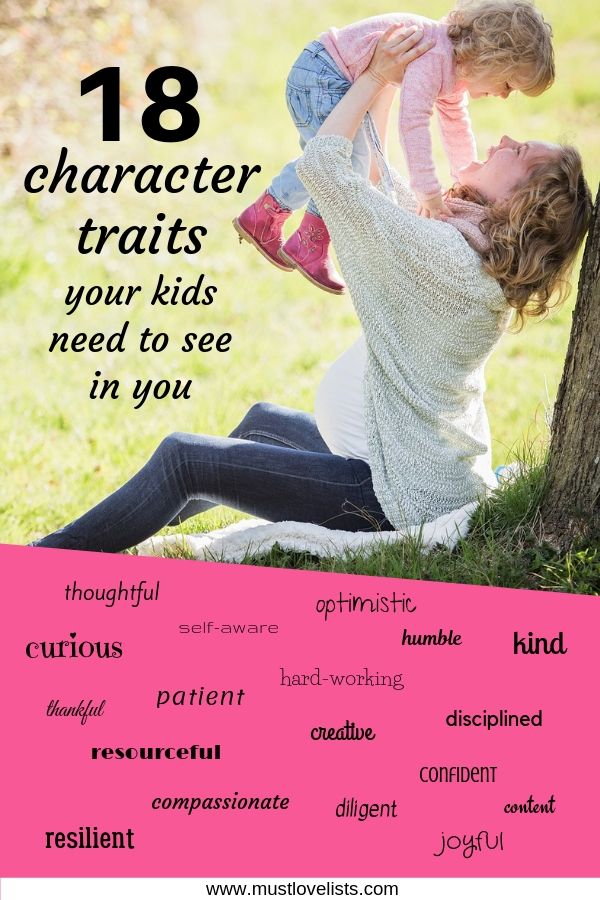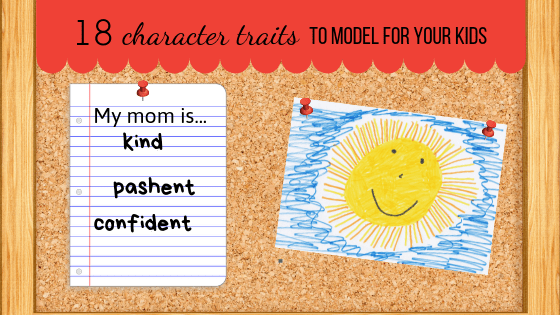Teaching Good Character to Kids
Since my kids started school, I’ve frequently reminded them that I am more impressed by stories of their kindness to other students, or hard work in tackling a big project, than I am by the grades they bring home. We have 18 oh-so-short years before we send them out into the big, wide world. The best way to instill habits or behaviors in our children is to model them. Here are 18 character traits to model for your kids. These are words I want to hear someone use to describe my daughters…and I want my daughters to honestly use these words to describe me.

1. Kind

If you haven’t yet read the book “Wonder” by R.J. Palacio, run out and find it at your local bookstore or library, or order it and you don’t have to go anywhere! I used it as a read-aloud with my three daughters and they LOVED it. The quote, “When you are given the choice between being right and being kind…choose kind,” is used eloquently in the book. We have the ability to choose kindness in speaking to our kids, and it can be powerful for them to witness us as the mom choosing to not say “I told you so,” but give encouragement and a kind word instead.
For more on kindness, read Character Counts: Teaching Kindness to Kids
2. Curious

Kids are naturally curious, but as my kids get older, I am giving some thought to the way my life imprints on my daughters their context for what “mom life” is like. I want them to retain their natural curiosity and desire to explore new ideas, so I have started to be more intentional about modeling curiosity. Sometimes we talk about something I learned from a book I’m reading, or we listen to a podcast on a topic I find interesting. It’s vital to establish a pattern of curiosity and a lifelong passion for learning that doesn’t end with childhood.
For more on curiosity read Character Counts: Encouraging Curiosity in Kids
3. Thoughtful

In our fast-paced world, we seem to think that we are too busy to be thoughtful, in the sense of showing consideration for others. However, I have found that thoughtfulness can be practiced in tiny doses, with disproportionately large benefits. There is a difference between kindness and thoughtfulness. You demonstrate kindness by inviting a kid who is sitting alone at recess to play with you and your friends. You demonstrate thoughtfulness by finding out what that kid likes to do and choosing to engage in that activity with them. There is a depth to thoughtfulness that requires a recognition of uniqueness in the preferences and needs of others.
4. Creative

If you’re not “crafty” or “artsy”, you may think that you are not creative. But you can model creativity for your kids without ever writing a book or painting a picture. Creativity is a way of looking at the world that seeks new solutions to problems. It is imagination applied to the real world. Your creative genius might be coming up with the perfect storage system for outgrown clothes to pass down from one child to the next. When you find a new way of solving a problem in your family, talk to your kids about it and label it as a creative solution. We want our kids to embrace a creative approach to thinking about the world, whether or not they pursue traditionally artistic endeavors.
For creative activities your child can do with paper, read 99 Fun Paper Activities for Kids.
For more on creativity read Character Counts: Encouraging Creativity in Kids
5. Hard-working

It’s hard work to make our kids do hard work. Not only are WE busy—THEY are too! By the time they get through sports practice, homework, and dinner, we’re all tired. Studies such as the famous Harvard Grant Study show that kids who are required to do chores at home are more successful later in life. This is one of those things where you just need to start somewhere. Don’t wait for the perfect chore chart or give up because a certain incentive system didn’t work for your family. Tell them they don’t get to watch TV till they help clean up dinner. Don’t allow any treats or dessert until they fold their clothes. You’ve got the power here, moms. Start small. Be willing to accept less than perfect; if they are giving it a solid effort, it’s a win.
6. Confident

Confidence in your abilities or knowledge may ebb and flow depending on the situation, but confidence in your innate value as a person, and the poise and self-possession that comes with that should be cultivated as a positive character trait. I don’t want my kids to derive their self-worth from the whims of others’ opinion. I want them to brush off rejection and exclusion without losing their belief in their inherent worth.
7. Joyful

The joy I want for my kids doesn’t have to look bubbly and enthusiastic 24/7. What I really want is for them to have an abiding sense of gladness and well-being.
For more on joy, read Character Counts: Encouraging Joy in Kids
8. Disciplined

Being able to choose the greater good or higher goal over what feels good in the moment makes the difference between exceptional accomplishment and a cycle of tedium. I want to teach my daughters to be intentional about their choices, recognizing that by saying “yes” to one thing, they are saying “no” to something else.
For more on self-discipline, read Character Counts: Encouraging Self-Discipline in Kids
9. Humble

The humility I seek for myself and my kids is not a lack of self-esteem, or feeling “less-than” anyone. I want them to be humble as opposed to proud. I don’t want them to monopolize conversations, to try to one-up someone else’s story, or to make every interaction an opportunity to show off. Being humble means valuing themselves, but not needing to boast of that value to others.
10. Optimistic

When I was young, my dad called me Eeyore, after the pessimistic Winnie-the-Pooh character. My optimism has developed as I’ve gotten older, but I want to instill in my daughters a deep-down hope that will see them through whatever life brings.
For more on optimism, read Character Counts: Encouraging Optimism in Kids
11. Diligent

Diligence, perseverance, and tenacity are foundational to accomplishing any goal. I know my kids will encounter failure in their lives. They need me to allow them to experience a taste of that while they are still young, in order to develop grit. Watch Angela Lee Duckworth’s popular TED talk about how “grit” is a useful predictor of success.
For more on diligence, read Character Counts: Encouraging Diligence in Kids
12. Patient

The ability to delay gratification is tough for adults, let alone kids. We tell young kids to be patient, but we don’t often explain what we mean. To be patient means that you are willing to wait for what you want. It is an acceptance that you are not, in fact, the center of the universe, and an acknowledgment that the world doesn’t revolve around your every whim.
13. Self-aware

Self-awareness is a valuable asset in understanding our reactions to circumstances and relationships with people around us. For a quick, but fascinating look at this topic, watch this TEDx talk from Tasha Eurich about the best question to ask in developing useful self-awareness.
Introduce your child to journaling as a way to get to know themselves. I have a list of 365 journal prompts for kids. Each day asks for a simple list of three answers. They range from silly to serious and are a great way to start your kids on a journey to think about what they are feeling, their favorite things, and what is important to them.
For more on self-awareness, read Character Counts: Encouraging Self-Awareness in Kids
Start your kids on a journaling practice of self-awareness with a simple daily journal.


14. Content

It is impossible to be content if we don’t limit our consumption. Being content doesn’t exclude a desire for change or working toward a goal, but it does exclude the endless striving for more.
15. Compassionate

To model compassion for my kids, I must truly care about the well-being of others. I want my daughters to have a genuine concern and sympathy for those who are hurting.
16. Adaptable

I put adaptability in the same category as resilience. It connotes an ability to pick yourself back up after a failure and learn from your mistakes. This trait maximizes your capability for growth and willingness to take on a challenge.
17. Resourceful

Resourceful people are problem-solvers. They have an ability to think inventively or imaginatively outside the box to make things work.
For more on resourcefulness, read Character Counts: Encouraging Resourcefulness in Kids
18. Thankful

“Say thank you,” is one of the first instructions we give our kids. Almost universally, we approve of a spirit of gratitude. There is much research demonstrating the benefits of gratitude, including better sleep, and overarching improvements in physical and psychological health. See this article from Psychology Today for a concise list of demonstrable benefits of gratitude. Life can be hard, and if we can teach our kids to express sincere thankfulness for what they have, we will have given them a precious and lasting gift.
For more on gratitude, read 30 Days of Thankful

Visit my homeschool resources page for monthly unit study ideas, projects, and homeschool planning help!






